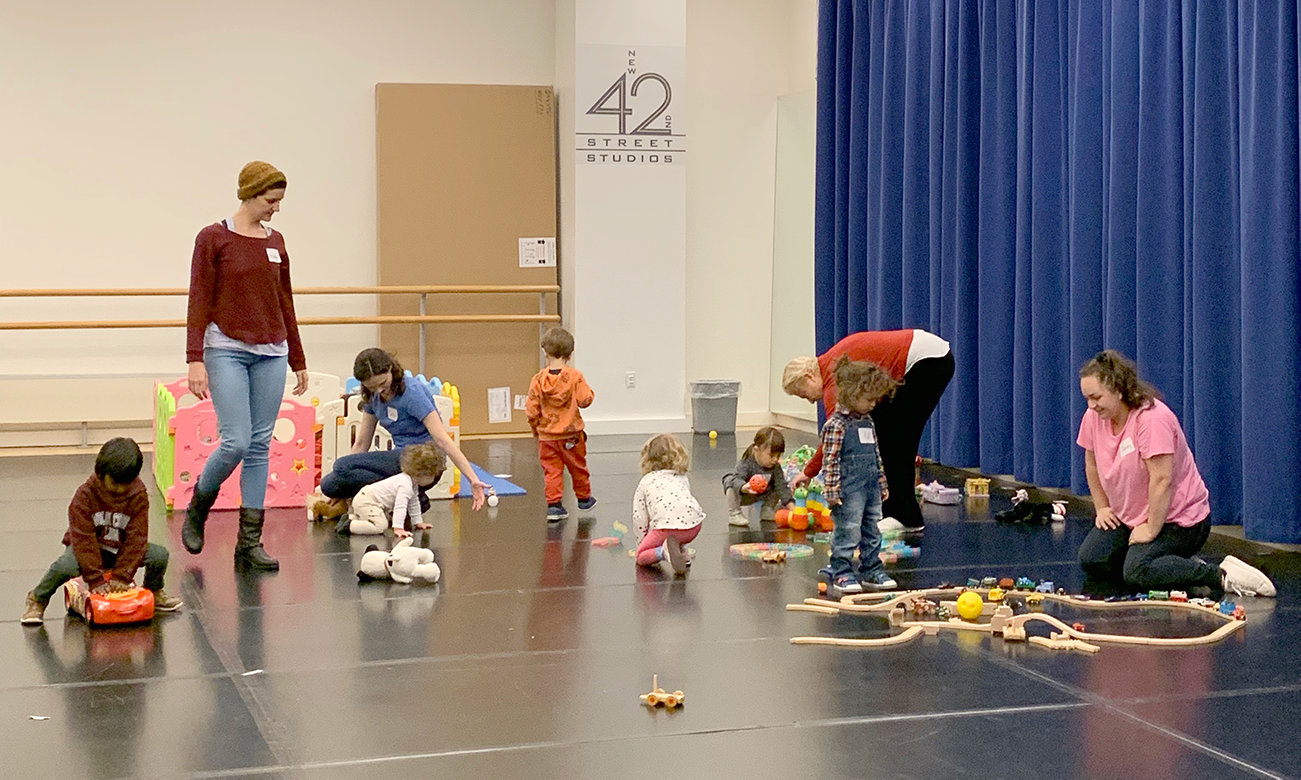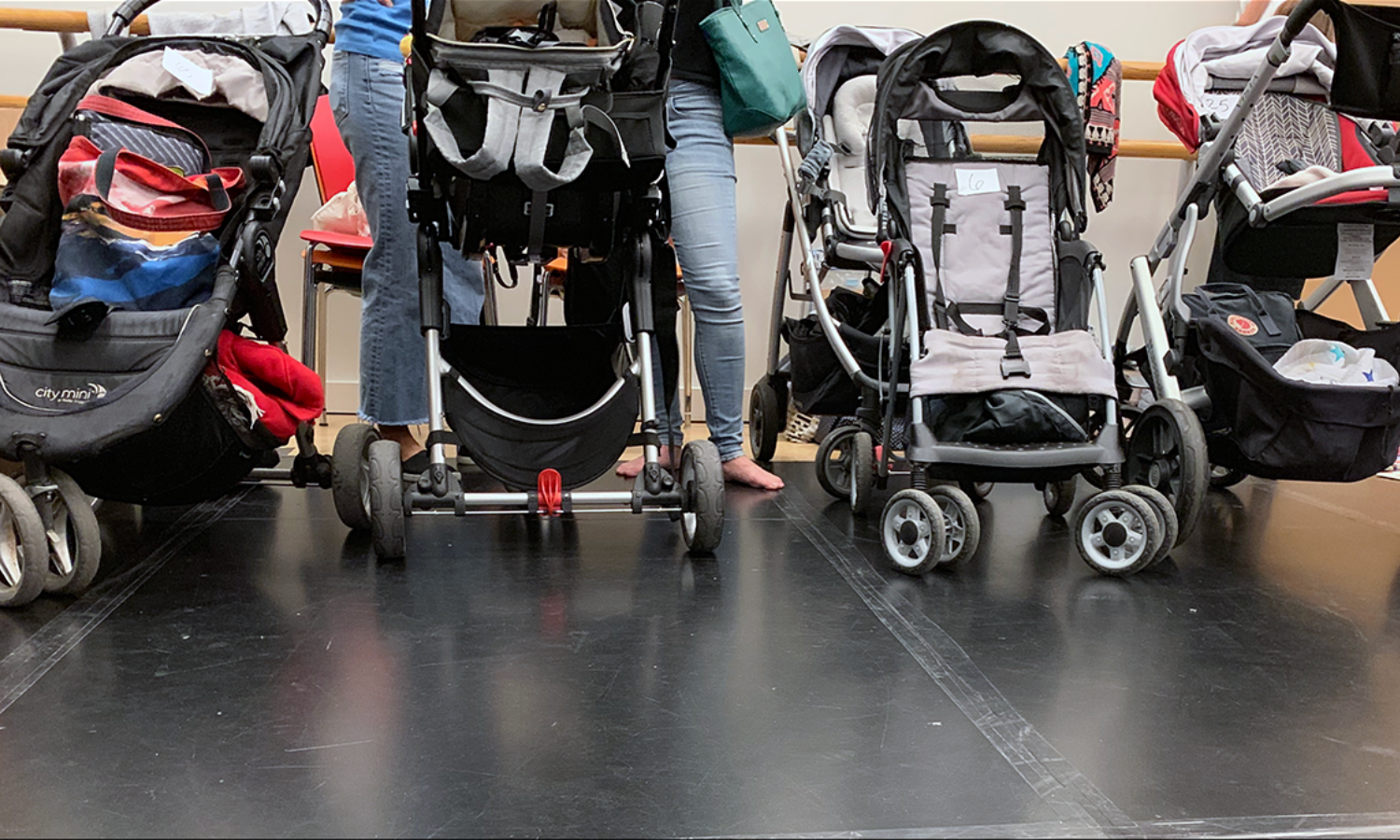Here are just a few ways the PAAL Handbook and the Playwrights Realm broke ground in adopting both researched and original solutions to create a production that comprehensively and transparently engages in active, radical parent inclusion.
Recommendation 1: Compassion Training
Any tangible initiatives to support caregivers—such as maternity leave, making space for children in the rehearsal rooms, or budgeting for childcare—must be preceded by intentional action to educate staff and create supportive work culture. For RPI, we used the PAAL Compassion Training Curriculum to prepare staff for the upcoming initiatives so that parents would experience supportive, educated exchanges no matter whom they engaged with throughout the production process. This training also serves to give staff an opportunity to engage in dialogue with a parent representative from PAAL about their concerns, learn helpful language when speaking with parents, and feel supported as they become responsible for implementing some of the new initiatives.
RPI Application: Roberta gathered the entire Playwrights Realm staff before rehearsals started to engage in a PAAL Compassion Training session. I led the group by creating a safe space for employee concerns, addressing non-parent questions, and engaging in dialogue on the socioeconomic, gender, and reproductive realities of equity, diversity, and inclusion that parent support directly addresses.
RPI Participant Feedback on Compassion Training and Institutional Transparency of Initiatives: “As I am not a caregiver, I’m so grateful for how much I’ve learned about caregiver needs throughout this process and am proud to be a part of this project.” And: “I’ve learned about laws regarding childcare and how to the needs of caregivers vary so much.”
The most significant result from this successful radical parent-inclusion process is its potential to be replicated and become the new national standard of support for caregivers in our field.
Recommendation 2: Budget for Support
What made RPI truly “radical” was the adoption of our recommendation to intentionally integrate inclusion into the budget narrative. The PAAL Handbook includes an interview with Ariana Smart Truman, of theatrical ensemble Elevator Repair Service, who has budgeted for parent support consistently for years. According to her, even when the boundaries are flexible and scope runs wide, parent support is affordable in its percentage of the overall numbers. The PAAL recommendation is to find the “stress points” of financial support on your timeline for parents—the areas parents need help with the most. Start there, then build out support from those points with flexible application. For RPI, we went through every budget line item to integrate parent support and even added items that may not be included on conventional production budgets but should be.
RPI Producer’s Note (Roberta Pereira): “One of the challenges was that, for fundraising purposes, we needed a more specific budget, but we didn’t yet know the exact solutions the parent artists would need us to provide as they had not yet been hired. I had to create a specific budget with things we thought parents would need and just make sure funders understood that the line items were flexible. Example: we originally budgeted for onsite childcare during tech, and we later found out that giving parents a larger stipend would be more helpful.”
RPI Application: Even if a theatre has limited resources, knowing the stress points means ensuring some of those resources directly apply to the areas of greatest need. Examples of stress points to budget for in RPI included the extended hours of tech week and after-hours networking opportunities, like opening night, post-show events, and galas. The amount designated on the budget line was set at a minimum of $750 per parent as a flexible, individual stipend. Other family-supportive budget line items were family-supportive housing for the playwright as a visiting artist, kid activities in the city, kid-friendly apartment amenities, and membership to Broadway Babysitters, a local babysitter service with mobile coverage that allows caregiving to take place at the theatre if need be.
RPI Boundaries for Audit: To keep the funds flexible but auditable, PAAL and the Playwrights Realm set the minimum amount per person, created a survey for individuals on the project to apply for funds, and supplied a required follow-up survey to track impact. These surveys are included in the PAAL Handbook. In order to be radically inclusive of caregiver needs, RPI expanded this stipend report for anyone with legal dependents, which meant the provision could apply to those with elder care and other-relative dependents.
RPI Participant Feedback on Financial Provisions for Caregiver Support: “As someone with a longer commute the stipend was more helpful than the sitter services because my daughter is in school.” And: “It was an enormous help and really was what allowed me to take the job. I can’t stress enough how the explicitly family-positive nature of this project made every decision easier.”
We went through every budget line item to integrate parent support and even added items that may not be included on conventional production budgets but should be.
Recommendation 3: Support for Employment Opportunities
A key element to radical inclusion is creating access to employment opportunities. If parent support only applies after employment begins, then employment will default to those privileged enough to show up for interviews and auditions and sustain life in between opportunities or while on the job hunt. It is illegal for an employer to ask in the interview process about family responsibilities, so any resource provision must be provided beforehand and to everyone. By allowing PAAL to facilitate audition support, parents auditioning could maintain anonymity with the future employer—in this case with the Playwrights Realm—while still receiving support.
To create employment opportunity support, include parent-support resources in job postings and casting notices, and provide childcare space, care, and/or financial support for auditions and callbacks so parents know they can access resources.
RPI Application: Partnering with Broadway Babysitters, we provided free childcare onsite at the open call Equity Principal Auditions as well as the auditions and callbacks made by appointment. While we provided coverage for the entire day of open calls two days in a row, it was clear that even a more selective provision would have sufficed. (In the future, a more sustainable practice would consist of collaborative support, providing a space onsite at a studio so that multiple productions could offer childcare for their open calls and appointments. PAAL is partnering with Broadway Babysitters to engage in sustainable strategies for this care.) For RPI, Broadway Babysitters coordinated the caregiving appointment times to line up with the parents’ audition appointments. In order for these open call and appointment auditions and callbacks to be truly accessible, in the casting notice we noted that childcare would be provided and included the link to register for free.
RPI Participant Feedback on Support for Employment Opportunities: “[My initial reaction was] intense relief, tears.” And: “It helped me choose to go in for this show on a day I hadn’t had childcare scheduled initially.” Plus: “I was able to prepare adequately. I usually have to schedule auditions during my daughter’s regular school day.” Finally: ‘‘This was the best audition experience I’ve ever had as a mother! I can’t thank you enough!!”
If parent support only applies after employment begins, then employment will default to those privileged enough to show up for interviews and auditions.
PAAL also engaged with the Playwrights Realm to adopt and apply principles of family-supportive scheduling (we used the five-day rehearsal week, engaged with school pickup conflicts, and considered the best way to manage school holidays, when children would be off and need full daycare), helped parents find sitters for their call times, and crafted protocols with management to allow children in the space. We also offered an incredibly successful childcare matinee with care provided onsite by Broadway Babysitters, developed methods for tracking the impact of parent support, provided research for grant applications, and more.
The Playwrights Realm now has a level of fluency in parent support that will allow them to continue to engage with intentional and sustainable support for the parents and caregivers who join them in the future. PAAL is continuing to apply this research in new ways to expand our understanding of what “radical” truly means, including educating the public on caregiver support for people with diverse abilities, partnering with StateraArts on building a transgender and non-binary parent resource database, and committing our own organization to Vertical 50/50, to ensure 50 percent of our representatives are people of color—not only overall in the organization but at every level to ensure conversations around parenting and anti-racism are integral to how we continue to form.




Comments
The article is just the start of the conversation—we want to know what you think about this subject, too! HowlRound is a space for knowledge-sharing, and we welcome spirited, thoughtful, and on-topic dialogue. Find our full comments policy here
Parenting is such a sensitive topic for many people including the parents. I’m glad there is theater like this to help and show people the work and progress going into everything. Even the picture struck a bit of joy into my heart.